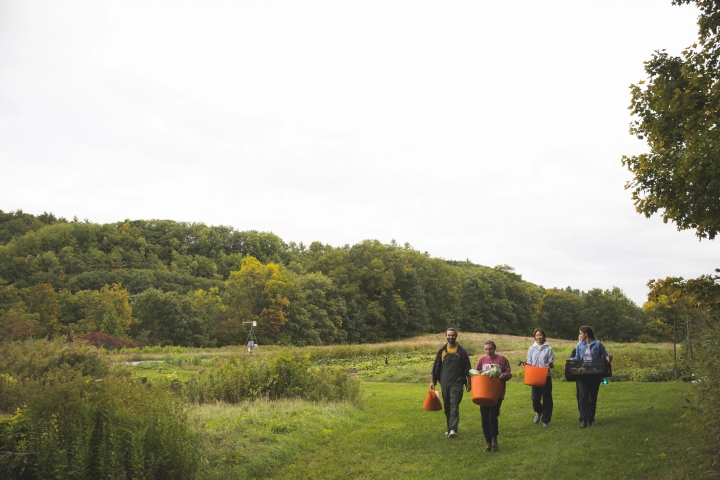It’s called “Food Day,” but Dartmouth’s celebration of all things edible is running the whole month of October, with events highlighting Indigenous food traditions, nutrition, agroecology, farmers and producers, and food systems in the Upper Valley and around the world.
“We’ve tried to raise awareness that food doesn’t just land on the plate,” says Beth Rosenberger, dietitian and nutritionist for Dartmouth Dining, which collaborated with the Dartmouth Sustainability Office and the Department of Environmental Studies to put on the festivities.
Organizers say Food Day (PDF) is “a call to action to ensure that every person has access to healthy, nutritious, and affordable food that is produced with care for the environment along with creating better working conditions for food and farm workers.”
Rowen White, a seed keeper/farmer, activist, and author from the Mohawk community of Akwesasne, will give the George Link Jr. Environmental Awareness Lecture/Food Day keynote speech at 4 p.m. on Oct. 23 in Steele 006.
White is the founder and creative director of Sierra Seeds, an Indigenous seed bank farm based in Nevada City, Calif., and recently won a James Beard Foundation Leadership Award for her work on building sustainable and just global food systems. Past Food Day speakers have included Leah Penniman, Malik Yakini, and Michael Pollan.
Theresa Ong, assistant professor of environmental studies and an agroecologist who runs the Ong Lab at Dartmouth, met White at a conference and was inspired by White’s work—and excited to learn her uncle, Hollis White ’74, is a Dartmouth alumnus.
Ong is looking forward to hearing about Rowen White’s experiences building Sierra Seeds and her work on Indigenous sovereignty and land stewardship. “I want to learn about her experiences building the seed library,” Ong says.
Rachel Kent ’21, Sustainability Office program assistant, describes White’s visit as “an incredible honor.” And at noon on Oct. 23, before White’s talk, all are welcome at the Seed and Story Swap with White at the Dartmouth Organic Farm. “Anyone can come and swap seeds if they have them,” Kent says, though seeds aren’t required to attend.

The Food Day festivities began on Sept. 28, with an agroforestry event at the Organic Farm. At the annual Harvest Dinner on Oct. 9, Dining Services prepared Indigenous recipes like blue corn cakes with choke cherries and locally sourced roast chicken and squash, according to Rosenberger.
On Tuesday, Oct. 17, the film Fruits of Labor will be screened at Loew Auditorium. Admission is free. The film tells the story of a Mexican-American teenager working in the strawberry fields and in a food processing facility on California’s Central Coast. “It’s important to highlight different voices in food systems that are often marginalized,” Ong says.
HarFest will happen at the Organic Farm on Oct. 28, with pizza, music, and crafts, focusing on everything “fun, fall, and farmy,” according to Kent.
In addition to the slate of organized events, Rosenberger will be traveling around campus with crates of locally grown apples for students to sample. In the early days of the Food Day celebration at Dartmouth, Rosenberger tried to organize students to take a bite of their apples at the same moment in an attempt to break a Guinness World Record. They didn’t break the record, but she says that Food Day at Dartmouth has survived—and evolved.
Kent says that the evolution of the event has been exciting to watch. “We are a microcosm,” she says. “We want to use our platform as an opportunity to gather folks around the world to amplify their voices. We have students here from all over the world. It’s important to bring speakers to campus who will represent their identities and where they come from.”
Ong describes how agroecology has offered a more holistic way of approaching food production. “It’s a science, a practice, and a movement intending to create a more sustainable food system,” she says.
And it’s a field of study that the Dartmouth community is embracing this month. Kent thinks that interest in food and farming will only continue to expand. She used a bit of food humor to express her hopes for food systems awareness at Dartmouth.
“The interest is there,” Kent says. “To continue to feed it is something I’m really interested in.”

